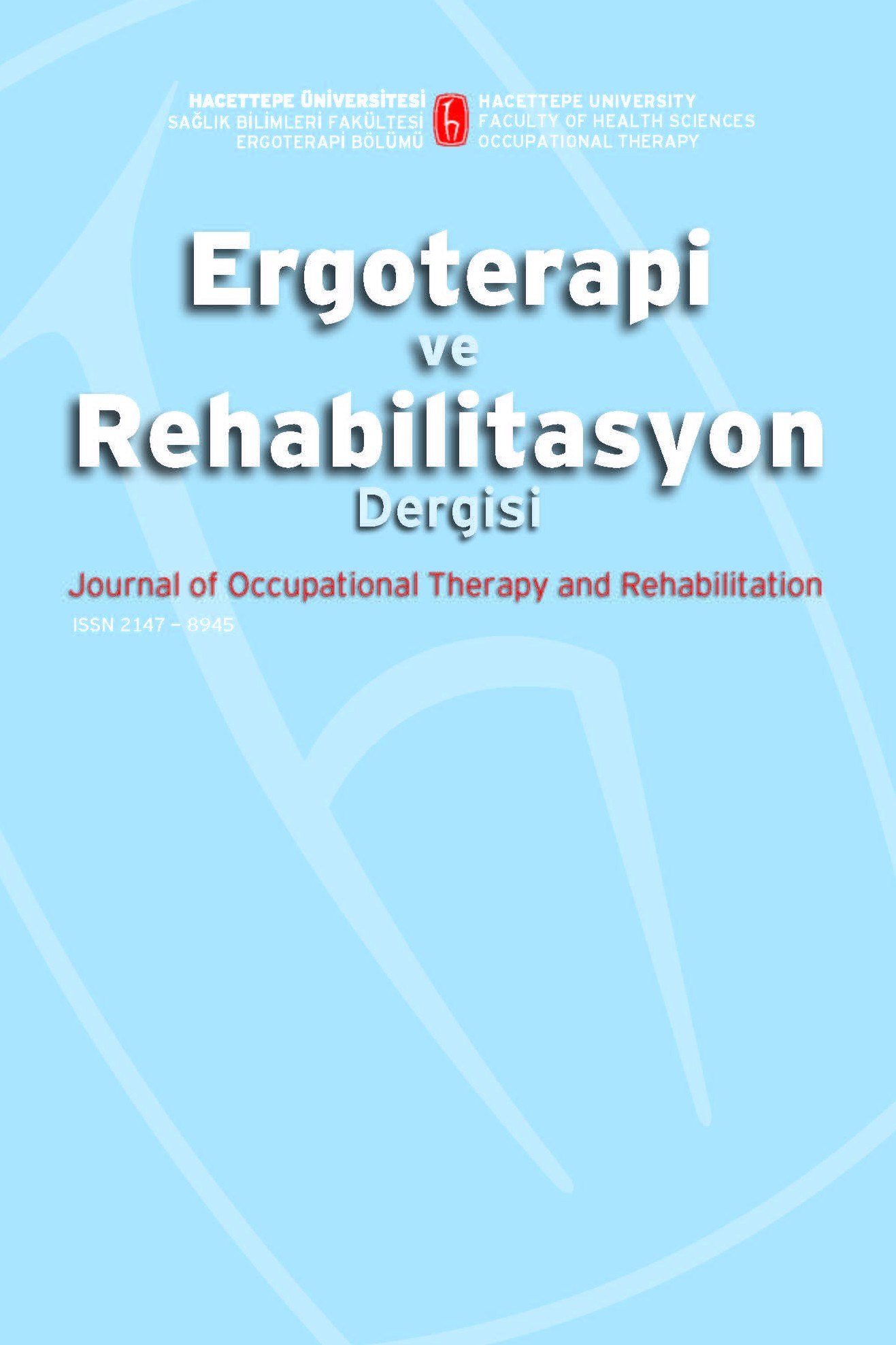Genç Erişkinlerde Videonistagmografi ile Yapılan Okülomotor Test Sonuçlarının İncelenmesi
Amaç: Videonistagmografi (VNG), vestibüler sistemi değerlendiren önemli bir laboratuvar testidir. VNG; okülomotor testler, gaze stabilizasyon testleri, pozisyonel testler ve kalorik alt testlerinden oluşur. Okülomotor testler (sakkad, pursuit ve optokinetik testler), santral vestibüler sistemi değerlendirir. Bu çalışma, genç erişkin bireylerin videonistagmografi (VNG) cihazı ile yapılan okülomotor test sonuçlarını incelemek amacıyla yapılmıştır. Gereç ve Yöntem: Bu makalede, 18-35 yaş aralığında, normal sınırlarda işitme eşiklerine sahip, vestibüler problemi olmayan, 25 genç erişkin bireyin (12 erkek 13 kadın) okülomotor değerlendirme sonuçları analiz edilmiştir. Sonuçlar: Çalışmada, VNG okülomotor testlerinin sağlıklı genç erişkinlere ait normatif değerleri sunulmuştur. Tartışma: Klinisyenlerin videonistagmografik okülomotor testlerin sonuçlarını yorumlamada kullanabilecekleri referans değerler belirlenmiştir.
Anahtar Kelimeler:
Baş dönmesi, göz hareketi ölçümleri, genç erişkin
Evaluation of Oculomotor Tests Findings Using Videonystagmography in Young Adults
Purpose: Videonystagmography is one of the important laboratory test which evaluates vestibular system. VNG consists of several subtests such as oculomotor tests, gaze stabilization tests, positional tests and caloric test. Oculomotor tests (saccade, tracking and optokinetic tests) assess central vestibular system. The aim of this study was to examine the results of oculomotor test in young adults by using VNG. Material and Method: In this paper, the results of oculomotor tests were evaluated in 25 young adults (12 males and 13 females) between 18-25 years of age with normal hearing and without vestibular problems.Results:The present study, a data base of normal values for VNG oculomotor tests in healthy young adults. Conclusions: Establishing normative data can provide references ranges using by clinicians to interpret results of videonistagmografic oculomotor tests.
Keywords:
Dizziness, eye movement mesurements, young adult,
___
- Referans1 Ardıç, F. N. (2019). Denge Sisteminin İşleyişi. Vertigo. (second edition, pp. 1-20). İzmir: Güven Kitabevi.
- Referans2. Bötzel, K., Rottach, K. & Büttner, U. (1993). Normal and pathological saccadic dysmetria. Brain, 116(2), 337-353.
- Referans3 Bhansali, S. A., Honrubia, V. (1999). Current Status of Electronystagmography testing. Otolaryngol Head Neck Surg, 120, 419–26.
- Referans4. Eggers, S. D. (2020). Practical anatomy and physiology of the ocular motor system. In Jacobson GP, Shepard NT, Barin K, Janky K. & McCaslin DL (Eds). Balance Function Assessment and Management. (3rd Edition, pp. 43-68). San Diego: Plural Publishing.
- Referans5 Gonçalves, V. P. & Scharlach, R. C. (2016). Oculomotor evaluation in adults: a study of the effect of age and visual alterations. Audiology-Communication Research, 21, e1704
- Referans6 Hain, T. C. (2019). Disorders of Saccadic Accuracy. Retrieved from June 01, 2020. https://www.dizziness-and-balance.com/practice/saccades/saccadic%20dysmetria.html
- Referans7 Kang, S., & Kim, U. S. (2015). Normative data of videonystagmography in young healthy adults under 40 years old. Korean Journal of Ophthalmology, 29(2), 126-130.
- Referans8 Krauzlis, R. J. (2008). Eye movements. In Squire, L., Berg, D., Bloom, F.E., Du Lac, S., Ghosh, A., & Spitzer, N. C. (Eds), Fundamental Neuroscience. (3rd Edition, pp.775-794). Academic Press.
- Referans9 Leigh, R. J. & Zee, D. S. (2015). The Vestibular-Optokinetic System. The Neurology of Eye Movements. (5th Edition pp. 55-168). New York: Oxford University. Referans10. McCaslin, D. L. (2019) Eye Movement Examination. In Electronystagmography and Videonystagmography (ENG/VNG), (2nd Edition, pp. 87-122). San Diego: Plural Publishing.
- Referans11 Mekki, S. (2014). The role of videonystagmography (VNG) in the assessment of dizzy patient. The Egyptian Journal of Otolaryngology, 30(2), 69-69.
- Referans12 Moschner, C. & Baloh, R. W. (1994). Age-related changes in visual tracking. Journal of Gerontology, 49(5), M235-M238.
- Referans13 Perepa, L. S. (2017). Objective evaluation of patients with vestibular disorders. Global Journal of Otolaryngology, 7(4), 555716.
- Referans14 Peterka, R. J. Sensorimotor integration in human postural control. (2002). Journal of neurophysiology. 88(3), 1097-1118.
- Referans15 Pollock, A. S., Durward, B. R., Rowe, P. J., & Paul, J. P. (2000). What is balance? Clinical rehabilitation. 14(4), 402-406.
- Referans16 Premachandra, P. (2013). Special investigations used in the assessment of the dizzy patient. The Otorhinolaryngologist, 6, 6-14.
- Referans17 Rucker, J. C., Shapiro, B. E., Han, Y. H., Kumar, A. N., Garbutt, S. & Leigh, R. J. Neuro-ophthalmology of late-onset Tay–Sachs disease. Neurology, 63, 1918–26.
- Referans18 Seferlis, F., Chimona, T. S., Papadakis, C. E., Bizakis, J., Triaridis, S. & Skoulakis, C. (2015). Age related changes in ocular motor testing in healthy subjects. Journal of Vestibular Research, 25(2), 57-66.
- Referans19 Stappen, A. V. D. (2000). Computerized electronystagmography: normative data revisited. Acta otolaryngologica, 120(6), 724-730.
- Referans20 Yılmaz, N., Söylemez, E., İla, K., Söylemez, T., Ertuğrul, S. (2020). Yaşlanmanın Okülomotor Fonksiyonlara Etkisi. KBB ve BBC Dergisi, 28(1), 16-2
- ISSN: 2147-8945
- Yayın Aralığı: Yılda 3 Sayı
- Başlangıç: 2013
- Yayıncı: Hacettepe Üniversitesi Sağlık Bilimleri Fakültesi
Sayıdaki Diğer Makaleler
Genç Erişkinlerde Videonistagmografi ile Yapılan Okülomotor Test Sonuçlarının İncelenmesi
Bilgehan TEKİN DAL, Nebil GÖKSU, Çağıl GÖKDOĞAN, Yusuf Kemal KEMALOĞLU
Leisure Time Physical Activity in Adolescents and Adults with Cerebral Palsy
Disleksili Çocuklarda Dans Hareket Terapisinin Praksis Üzerindeki Etkisi; Vaka Serisi Çalışması
